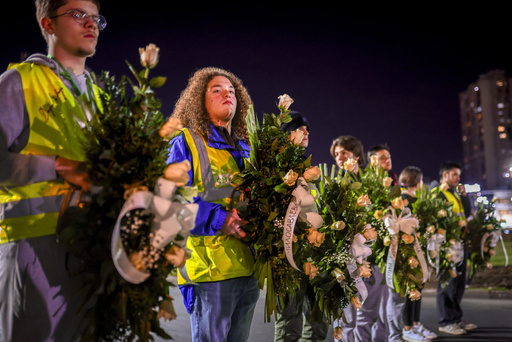
Novi Sad, Serbia – On Saturday, students in Serbia are poised to enact significant protests, including barricading three bridges over the Danube River in the northern city of Novi Sad. This event coincides with the three-month anniversary of a tragic incident on November 1 when a concrete canopy collapsed at a train station, resulting in the deaths of 15 individuals.
The collapse has catalyzed a broader anti-corruption movement, igniting prolonged student-led demonstrations that criticize the populist government in Serbia. A prevailing sentiment among the public suggests that the disaster stemmed from corrupt practices linked to a major infrastructure project managed by Chinese state firms.
Critics argue that corruption led to substandard work during the train station’s reconstruction, along with inadequate oversight and blatant disregard for safety protocols. This incident has become a powerful symbol of growing discontent with the state of the rule of law in Serbia.
Anticipations are high, with tens of thousands expected to gather in Novi Sad for the protest event aptly named “Three Months — Three Bridges.” Notably, one bridge blockade is scheduled to continue into Sunday.
In the lead-up to the rally, traffic congestion filled roads leading to the city as many flocked to participate in the event. University students have emerged as the forefront leaders in these protests, which stand as one of the most significant challenges to President Aleksandar Vucic’s authority in recent years.
The sustained demonstrations have already compelled the resignation of Prime Minister Milos Vucevic earlier this week and prompted various concessions from the government in an attempt to mediate the growing public unrest.
On Friday evening, a substantial crowd greeted the students from Belgrade who had walked for two days to join the blockades. In an expression of solidarity, students from Novi Sad rolled out a small red carpet to welcome them, an emotional scene reflecting the shared grief over the November tragedy and a spirit of unity in their ongoing protests.
In addition to activities in Novi Sad and Belgrade, protests and road blockades have unfolded across the country, frequently marred by incidents of violence—including a situation in Belgrade on Friday where two women were struck by a car driven into a group of protesters.
On the same day, students from both cities paid tribute to the victims by carrying wreaths engraved with the names of the deceased as they made their way to the station site. During their arduous 80-kilometer (50-mile) trek from Belgrade to Novi Sad, they were met with support from local communities, who cheered, offered food, and provided refreshments along the route.
Additionally, numerous supporters on bicycles and motorcycles joined the procession on Friday, while taxi drivers in Belgrade pledged to transport the demonstrators home on Sunday. Dunja Grabos, a student from Novi Sad, expressed pride in the efforts of participants from both cities: “It’s not easy. They limp, they have blisters, their feet hurt.”

